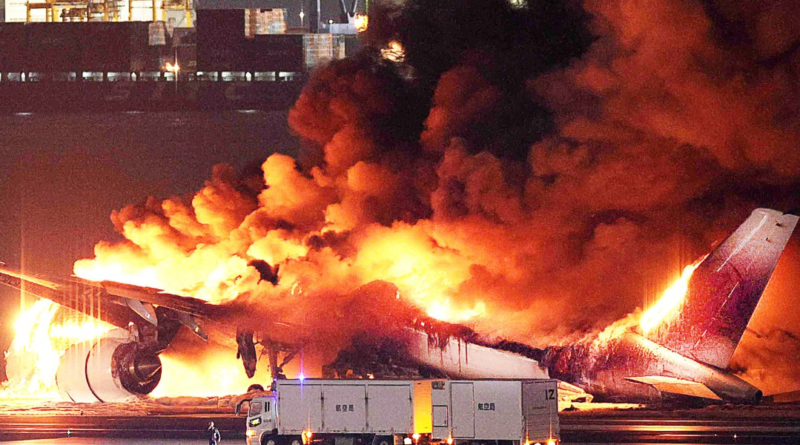Japan Airlines jetliner collides with hurricane relief mission from coast guard, killing 5 crew members in fiery crash
All 379 people aboard a Japan Airlines Co. flight managed to escape after the Airbus jetliner burst into flames following a collision with a smaller plane as it landed at Haneda Airport in Tokyo, while most of the crew aboard the other aircraft were killed.
Passengers and crew were safely evacuated from the Airbus SE A350-900, an airline spokesperson said. Five of the six crew on a Japanese coast guard plane that was preparing to depart for an earthquake relief mission have died, according to the government. Officials said the captain of the smaller plane was able to escape the crash and has regained consciousness.
Footage from the airfield outside the Haneda airport building appeared to show the Airbus jet colliding with the other aircraft just after touching down after dark, then skidding on in a trail of flames. The JAL jet could be seen tilted forward with a collapsed front landing gear, flames licking from its windows and smoke billowing over the fuselage as fire services battled the blaze. Play Video
Later footage showed the entire aircraft engulfed in a massive blaze, suggesting the plane is damaged beyond repair. The widebody jet was carrying 367 passengers and 12 crew. Broadcaster NHK said that at least 17 people on the JAL plane were injured.
Japanese transport ministry and coast guard officials said Tuesday evening they were investigating but couldn’t provide details on the cause of the incident or whether it could have been prevented. The ministry’s transport safety board will seek to determine whether any miscommunication occurred in the air traffic control operation.
Flight JL516 took off from New Chitose airport near Sapporo at 4:27 p.m. local time, according to FlightRadar24. The two-year-old A350 landed at Runway C at Haneda Airport at 5:47 p.m.
【羽田空港 日本航空の機体が炎上】
国土交通省東京空港事務所によりますと、羽田空港でJALの旅客機から炎があがっていると聞いているが客が搭乗しているかどうかなどはまだわからない、情報を確認中だと話していました。https://t.co/UGWveQ1hVi#nhk_video pic.twitter.com/s4YDQhcfll— NHKニュース (@nhk_news) January 2, 2024
Airbus said it was in contact with the airline but had no further information to offer. Japanese Prime Minister Fumio Kishida ordered an investigation into the collision and to spur aid to the possible victims.
Japan Airlines operates a fleet of 16 A350-900s, seating either 369 or 391 passengers in a so-called high density domestic configuration. The carrier has been flying the type since 2019.
The advanced A350 is Airbus’s flagship aircraft that entered into service in 2015, equipped with fuel-efficient Trent XWB engines from Rolls-Royce Holdings Plc and a lightweight, carbon composite fuselage. JAL has also ordered the larger A350-1000 model.
The aircraft would be the first A350 hull to be destroyed by an accident. The smaller coast-guard aircraft, a De Havilland Canada Dash 8, was carrying aid to the earthquake-hit parts of Japan following Monday’s quake that toppled buildings in the Noto Peninsula on Japan’s northwest coast.
The incident at Haneda, which is Japan’s busiest airport, occurred as authorities rush to provide aid to victims of Monday’s massive earthquake, with local governments calling for supplies of water, food and other necessities.
On-ground impacts between aircraft are rare and damage is typically minor because collisions tend to happen during slower taxiing. The worst disaster in aviation history happened during a ground collision in 1977, when two Boeing 747 jumbo jets collided on the runway at Los Rodeos Airport on the Spanish island of Tenerife, killing 583 people.
Haneda Airport has not suffered a fatal aircraft accident since February 1982 when a McDonnell Douglas JAL crashed near the airfield into Tokyo Bay, resulting in the death of 24 of the 174 people on board, according to the Aviation Safety Network.
The hub was closed after Tuesday’s accident. FlightRadar24 shows about 170 flights scheduled to arrive at Haneda on Tuesday evening either canceled or diverted to airports including Tokyo Narita airport.
“We aim to revive flight operations at Haneda as soon as possible” Tatsuo Sato, minister of land, infrastructure, transport and tourism, said Tuesday evening at a briefing.




